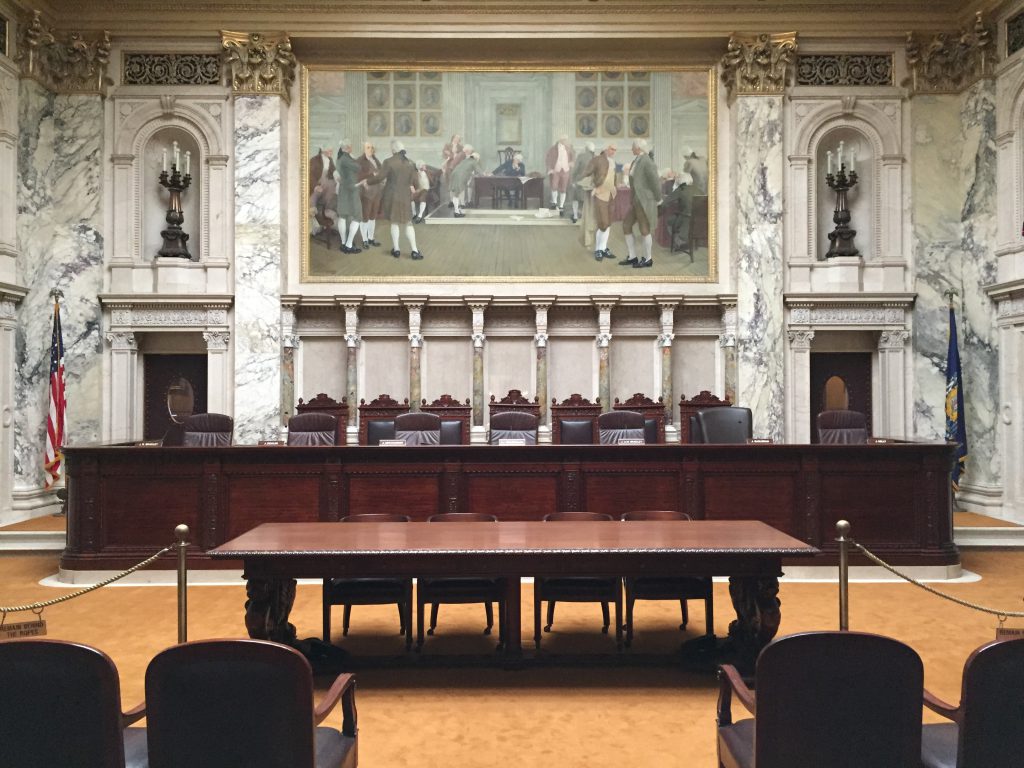State Supreme Court Is Radically Activist
Record shows many examples of grabbing cases before lower courts rule.
One of the striking characteristics of the conservatives on the Wisconsin Supreme Court is their eagerness to take over cases from the lower courts, rather than lie back and let cases percolate through the legal system. Here are several examples.
Coronavirus case
Wisconsin Legislature v. Andrea Palm.
The Wisconsin Supreme Court accepted this case as an “original action” in response to a request from the Republican leaders of the state Legislature. “Original action” means that legislators did not need to first go through the circuit court or the Court Appeals. You can see the case’s history here.
The court ruled in a 4-3 decision on May 13 of this year that Health Secretary Andrea Palm needed legislative approval of her emergency order in response to the COVID-19 pandemic. Joining Chief Justice Patience Roggensack’s majority decision were Justices Annette Ziegler, Rebecca Bradley and Daniel Kelly. Justices Ann Walsh Bradley, Rebecca F. Dallet and Brian Hagedorn dissented.
Since the legislators refused to negotiate with Palm or Governor Tony Evers, the orders expired. The result was a spike of COVID-19 cases in Wisconsin, peaking in late July.
Voter purge case
Timothy Zignego v. Wisconsin Elections Commission
Unlike other cases on this list, this is not an example of original action. Rather it is an example of an attempt to skip the Court of Appeals and take the appeal directly to the Supreme Court. The petition to bypass the appeals court failed because it received support from only three Justices (Roggensack, Ziegler, and Rebecca Bradley). Kelly, facing reelection, did not participate. Anne Walsh Bradley, Dallet and Hagedorn did not support the petition.
While the district court supported the voter roll purge, its ruling was overturned by a three-judge Appeals Court panel. State law states that, “If the elector … fails to apply for continuation of registration within 30 days of the date the notice is mailed, the clerk or board of election commissioners shall change the elector’s registration from eligible to ineligible status.” The appeals court judges concluded “board of election commissioners” refers to the local election commissioners in the city and county of Milwaukee, not the state Elections Commission.
DPI Case
Koschkee v. Evers (now Taylor).
This case, another original action, started when Evers was Superintendent of Public Instruction and Scott Walker was governor. The issue was whether rules from the Department of Public Instruction are subject to approval from the governor. In a decision in 2016 the Wisconsin Supreme Court decided that a new law that required this was unconstitutional. However, membership on the court had since changed.
The second decision came a year later. In June 2019, in a 4-2 decision, the court majority decided that, prior to drafting or promulgating an administrative rule, the Department of Public Instruction and its Superintendent must receive written approval from the governor. Voting in the majority were Justices Roggensack, Ziegler, Kelly and Rebecca Bradley. Justices Anne Bradley and Rebecca Dallet dissented.
The limits of academic speech
Marquette v. McAdams
This case, in which the Wisconsin Supreme Court bypassed the Court of Appeals, challenged Marquette’s discipline of a faculty member who had publicly attacked a graduate teaching assistant in his blog. Justice Kelly wrote the 63-page majority decision, joined by Justices Roggensack, Gableman, and Rebecca Bradley. Justices Ann Walsh Bradley and Shirley Abrahamson dissented.
Lame duck session
During the lame duck session, between the defeat of Walker and the inauguration of Evers, the Republican-dominated Legislature passed a number of laws which Walker signed. Generally, these were aimed at enhancing the power of the Legislature against that of the newly elected Democratic governor and attorney general. This led to several legal challenges.
An example is Service Employees International Union (SEIU) v. Robin Vos. Justice Dallet comments: “This case was snatched from the circuit court in its infancy, on the eve of the first trial on the challenged provisions. Consequently, the facts have not been developed and the parties have not had the opportunity to amend their pleadings to conform to those facts.” She goes on to list the many issues, both factual and legal, that will have to be decided.
Again and again, conservatives on the Wisconsin Supreme Court have snatched cases they find interesting away from lower courts, both the district courts and the court of appeals. Yet it is a basic principal that the trial court is the finder of fact, to which appellate courts owe deference.
Being at the top of the pyramid, as Wisconsin Supreme Court justices are, has drawbacks. One is the tendency to arrogance. It is easy to equate a lack of accountability with superior wisdom and intelligence. One’s decisions, since they cannot be reversed, are proof of infallibility.
Conservative Justices on the Wisconsin Supreme Court seem to have fallen into the infallibility trap. When it appears that lower court judges seem poised to decide a case differently than they would, the current “conservative” Justices are poised to jump in to prevent this “error.” This is an exceptionally activist approach.
With a few exceptions, briefs are written by advocates, people who are hired to push one side of the argument or the other. Judges, by contrast, are not paid to be advocates. For a thoughtful justice, the ability to review a trial court’s reasoning and conclusions should be an advantage, not a threat.
Finally, an appellate process unmoored from factual findings or a fully developed record is antithetical to the legal ideal of justice. The traditional symbols of impartial justice, the blindfolded figure to indicate impartiality, or the balanced scales, are thus rendered obsolete. Instead, this snatching of cases from the lower courts could be more accurately represented by a partisan figure peeking from under the blindfold, or a heavy thumb placed on a scale, causing it to tip to one side.
Data Wonk
-
Life Expectancy in Wisconsin vs. Other States
 Dec 10th, 2025 by Bruce Thompson
Dec 10th, 2025 by Bruce Thompson
-
How Republicans Opened the Door To Redistricting
 Nov 26th, 2025 by Bruce Thompson
Nov 26th, 2025 by Bruce Thompson
-
The Connection Between Life Expectancy, Poverty and Partisanship
 Nov 21st, 2025 by Bruce Thompson
Nov 21st, 2025 by Bruce Thompson























Thanks for this excellent summary Bruce.
There are some sober realities related to legitimacy crises. The first is that nobody rings a bell when they are about to arrive. The second is that nobody understands how to get out of them. Like lost trust, once gone, legitimacy is very hard to recover. And, finally, the consequences for a nation’s or state’s institutions losing their legitimacy are always severe.
In the old television western “Cheyenne,” the hero, Cheyenne Bodie, is hauled before a kangaroo court on some trumped up charge. At some point, the judge demands of Cheyenne, “Are you showing contempt for this court? To which, Cheyenne responds, “No judge, I’m trying to hide it.” What was once the nation’s premier state Supreme Court is drifting very close to large numbers of people being in Cheyenne territory. That’s a dangerous place to be.
As usual, Bruce provides a thoughtful summary and analysis of an important development that has not received the attention that it deserves.